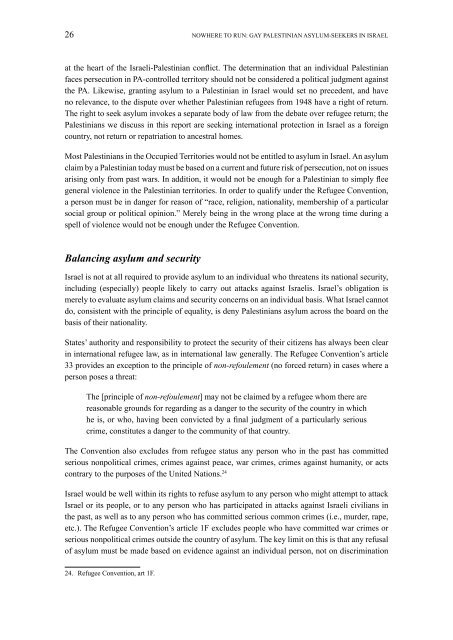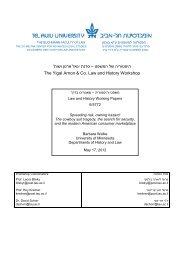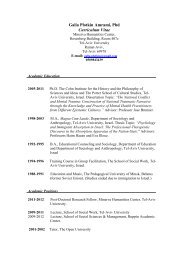NOWHERE TO RUN: GAy PALESTINIAN ASyLUM-SEEKERS
NOWHERE TO RUN: GAy PALESTINIAN ASyLUM-SEEKERS
NOWHERE TO RUN: GAy PALESTINIAN ASyLUM-SEEKERS
Create successful ePaper yourself
Turn your PDF publications into a flip-book with our unique Google optimized e-Paper software.
26 <strong>NOWHERE</strong> <strong>TO</strong> <strong>RUN</strong>: <strong>GAy</strong> <strong>PALESTINIAN</strong> <strong>ASyLUM</strong>-<strong>SEEKERS</strong> IN ISRAEL<br />
at the heart of the Israeli-Palestinian conflict. The determination that an individual Palestinian<br />
faces persecution in PA-controlled territory should not be considered a political judgment against<br />
the PA. Likewise, granting asylum to a Palestinian in Israel would set no precedent, and have<br />
no relevance, to the dispute over whether Palestinian refugees from 1948 have a right of return.<br />
The right to seek asylum invokes a separate body of law from the debate over refugee return; the<br />
Palestinians we discuss in this report are seeking international protection in Israel as a foreign<br />
country, not return or repatriation to ancestral homes.<br />
Most Palestinians in the Occupied Territories would not be entitled to asylum in Israel. An asylum<br />
claim by a Palestinian today must be based on a current and future risk of persecution, not on issues<br />
arising only from past wars. In addition, it would not be enough for a Palestinian to simply flee<br />
general violence in the Palestinian territories. In order to qualify under the Refugee Convention,<br />
a person must be in danger for reason of “race, religion, nationality, membership of a particular<br />
social group or political opinion.” Merely being in the wrong place at the wrong time during a<br />
spell of violence would not be enough under the Refugee Convention.<br />
Balancing asylum and security<br />
Israel is not at all required to provide asylum to an individual who threatens its national security,<br />
including (especially) people likely to carry out attacks against Israelis. Israel’s obligation is<br />
merely to evaluate asylum claims and security concerns on an individual basis. What Israel cannot<br />
do, consistent with the principle of equality, is deny Palestinians asylum across the board on the<br />
basis of their nationality.<br />
States’ authority and responsibility to protect the security of their citizens has always been clear<br />
in international refugee law, as in international law generally. The Refugee Convention’s article<br />
33 provides an exception to the principle of non-refoulement (no forced return) in cases where a<br />
person poses a threat:<br />
The [principle of non-refoulement] may not be claimed by a refugee whom there are<br />
reasonable grounds for regarding as a danger to the security of the country in which<br />
he is, or who, having been convicted by a final judgment of a particularly serious<br />
crime, constitutes a danger to the community of that country.<br />
The Convention also excludes from refugee status any person who in the past has committed<br />
serious nonpolitical crimes, crimes against peace, war crimes, crimes against humanity, or acts<br />
contrary to the purposes of the United Nations. 24<br />
Israel would be well within its rights to refuse asylum to any person who might attempt to attack<br />
Israel or its people, or to any person who has participated in attacks against Israeli civilians in<br />
the past, as well as to any person who has committed serious common crimes (i.e., murder, rape,<br />
etc.). The Refugee Convention’s article 1F excludes people who have committed war crimes or<br />
serious nonpolitical crimes outside the country of asylum. The key limit on this is that any refusal<br />
of asylum must be made based on evidence against an individual person, not on discrimination<br />
24. Refugee Convention, art 1F.




